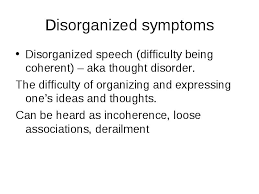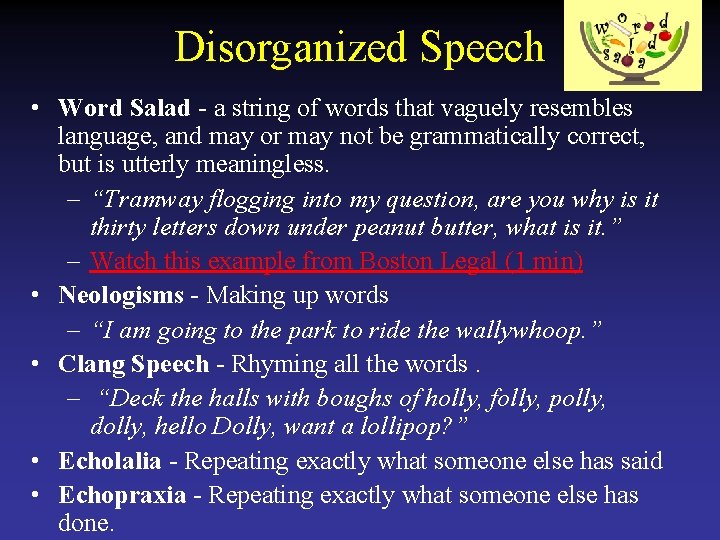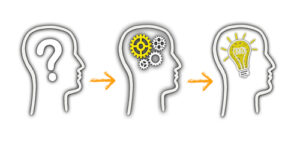Disorganized speech can be a difficult thing to understand and live with. It can cause problems in many different areas of life, including work, school, and social settings. This blog post will provide an in-depth look at disorganized speech, from the different types to the causes and treatment methods. We will also hear from experts and people living with this condition to get their perspectives on what it is like to deal with disorganized speech.
Contents
Understanding Disorganized Speech

Disorganized speech is a type of communication disorder that can make it difficult to understand what someone is saying. This can happen because the person has trouble putting their thoughts into words, or they may use words that don’t make sense. Disorganized speech can also be hard to follow because the person may jump from one topic to another without warning.
Types of Disorganized Speech
There are three main types of disorganized speech:
- Tangled Speech: This is when a person has trouble putting their thoughts into words. They may use made-up words or phrases, and their speech may be hard to follow.
- Loose Associations: This is when a person jumps from one topic to another without warning. Their speech may be hard to follow because it is not clear how the topics are related.
- Word Salad: This is when a person uses words that don’t make sense or they put words together in a strange way. Their speech may be hard to understand because it seems like they are speaking another language.
Symptoms of Disorganized Speech

The symptoms of disorganized speech can vary depending on the type. Some common symptoms include:
- Tangled Speech: Made-up words, trouble finding the right word, long pauses in speech, speaking in a jumbled way.
- Loose Associations: Jumps from one topic to another without warning, tangents that are unrelated to the conversation, hard-to-follow speech.
- Word Salad: Words that don’t make sense, speaking in a jumbled way, hard to understand speech.
DSM And Its Criteria
The Diagnostic and Statistical Manual of Mental Disorders (DSM) is a book that mental health professionals use to diagnose mental disorders. The DSM-V, the most recent version, has nine criteria for the diagnosis of disorganized speech. The person must have:
- Trouble putting their thoughts into words
- Made-up words or phrases
- Long pauses in speech
- Speech that is hard to follow
- Jumps from one topic to another without warning
- Tangents that are unrelated to the conversation
- Words that don’t make sense
- Speaking in a jumbled way
- Hard-to-understand speech
Causes of Disorganized Speech
The exact cause of disorganized speech is unknown. However, it is believed to be caused by a combination of genetic and environmental factors.
Some conditions that have been linked to disorganized speech include:
- Tourette Syndrome: A condition that causes people to make sudden, uncontrolled movements or sounds (tics).
- Attention Deficit Hyperactivity Disorder (ADHD): A condition that causes problems with focus, hyperactivity, and impulsiveness.
- Autism Spectrum Disorder: A condition that affects social interaction, communication, and behavior.
- Obsessive-Compulsive Disorder (OCD): A condition that causes repetitive thoughts and behaviors.
Living With Disorganized Speech

Disorganized speech can cause problems in many areas of life, including work, school, and social settings. People with this condition may have trouble holding a conversation or keeping a job. They may also be teased or bullied by others.
There are many challenges that people with disorganized speech face. Here are some of the most common:
- Work: People with disordered speech may have trouble keeping a job. This is because they may have trouble communicating with co-workers or customers.
- Campus: Many college students have trouble communicating with their peers and professors. This can make it difficult to make friends and do well in school.
- Relationships: Disorganized speech can make it difficult to maintain relationships. This is because the person may have trouble communicating their thoughts and feelings.
- Social Settings: Disorganized speech can make it difficult to participate in social activities. This can lead to isolation and loneliness.
Treating Disorganized Speech
There is no cure for disorganized speech. However, there are treatment methods that can help people manage the condition. Treatment typically involves a combination of therapies, medication, and self-help strategies.
Self-help Tips

Some self-help tips that people with disordered speech can use include:
Tangled Speech
- Practice saying words out loud. This can help you learn how to put your thoughts into words.
- Take your time when speaking. This will give you time to think about what you want to say.
- Write down what you want to say before you say it. This can help you organize your thoughts.
Loose Associations
- Stay on topic when speaking. This will help the person you are talking to follow your train of thought.
- Practice talking about one topic at a time. This will help you learn how to stay on topic.
- Write down what you want to say before you say it. This can help you organize your thoughts.
Word Salad
- Practice saying words out loud. This can help you learn how to put your thoughts into words.
- Take your time when speaking. This will give you time to think about what you want to say.
- Write down what you want to say before you say it. This can help you organize your thoughts.
Self-Help Strategies
There are many things that people with this condition can do to help themselves. Some self-help tips include:
- Finding a support group or therapist who understands the condition.
- Learning as much as possible about the condition.
- Practicing communication skills with friends and family.
- Joining a social club or activity group.
Treatment Methods

Treatment methods for each type of this condition will vary depending on the severity of the symptoms. Some treatment options include:
Tangled Speech
- Speech therapy: A type of therapy that can help you learn how to put your thoughts into words.
- Cognitive-behavioral therapy: A type of therapy that can help you change the way you think about speaking.
- Medication: There are no medications specifically for tangled speech. However, some medication may be prescribed to treat conditions that may be causing symptoms, such as ADHD or OCD.
Loose Associations
- Speech therapy: A type of therapy that can help you learn how to stay on topic when speaking.
- Cognitive-behavioral therapy: A type of therapy that can help you change the way you think about speaking.
- Medication: There are no medications specifically for loose associations. However, some medication may be prescribed to treat conditions that may be causing symptoms, such as ADHD or OCD.
Word Salad
- Speech therapy: A type of therapy that can help you learn how to put your thoughts into words.
- Cognitive-behavioral therapy: A type of therapy that can help you change the way you think about speaking.
- Medication: There are no medications specifically for word salad. However, some medication may be prescribed to treat conditions that may be causing symptoms, such as schizophrenia or bipolar disorder.
Talking To a Professional

If you or someone you know is struggling with disorganized speech, talking to a professional can be helpful. There are many treatment options available and a professional can help you find the best one for your needs. A therapist or counselor can help you learn how to manage your symptoms. They can also help you cope with the challenges that disorganized speech can cause.
Case Study
I am a college student with disorganized speech. I have trouble communicating with my peers and professors. This has made it difficult to make friends and do well in school.
I have been seeing a therapist for help with my symptoms. They have taught me some self-help techniques that have helped me manage my symptoms. I am also taking medication to help with my symptoms.
However, I have found that the most challenging part of living with disorganized speech is the isolation I feel. I have trouble participating in social activities because of my condition. This has led to me feeling lonely and left out.
However, I am working on managing my symptoms and I am hopeful for the future. I know that many people understand what I am going through and that I am not alone.
Hearing From Experts
Many experts have studied disorganized speech and its effects on those who live with it.
- Dr. Richard J. Heitz is a professor of psychiatry and behavioral sciences at the University of California, Irvine. He is also the director of the UCI Brain Imaging Center. In his book, “Disorganized Speech: Causes, Consequences, and Treatment,” Dr. Heitz discusses the different types of disorganized speech and their symptoms. He also discusses the causes of disorganized speech and how it can be treated.
- Dr. Nancy C. Andreasen is a professor of psychiatry at the University of Iowa. She is also the director of the Iowa Neuroscience Institute. In her book, “The Creating Brain: The Neurobiology of Genius,” Dr. Andreasen discusses the link between genius and disorganized speech. She also discusses the different types of genius and how they are often associated with disorganized speech.
- Dr. Daniel R. Weinberger is a professor of psychiatry at Johns Hopkins University. He is also the director of the Lieber Institute for Brain Development. In his book, “The Neuroscience of Psychopathology: Brain Mechanisms Underlying Disorganized Speech,” Dr. Weinberger discusses the different types of disorganized speech and their symptoms. He also discusses the causes of disordered speech and how it can be treated.
Each of these experts has done extensive research on the topic and has written books or articles on the subject.
Brain Activity
In a study published in the journal “Brain and Language,” Dr. Heitz and his colleagues looked at the brain activity of people with disorganized speech. They found that the areas of the brain responsible for language are less active in people with disordered speech. This suggests that disorganized speech may be caused by a problem with how the brain processes language.
Resources
If you or someone you know is struggling with disorganized speech, there are many resources available.
- The National Institute of Mental Health (NIMH) is a good place to start. The NIMH website has information on the different types of disorganized speech and their symptoms. They also have information on the causes of disorganized speech and how it can be treated.
- The American Psychiatric Association (APA) is another good resource. The APA website has information on the different types of disordered speech and their symptoms. They also have information on the causes of disorganized speech and how it can be treated.
Conclusion
Disordered speech is a common problem that can cause many challenges. However, there are many resources available to help those who live with it. With the right treatment, disordered speech can be managed and its effects can be minimized.
If you or someone you know is struggling with disorganized speech, talk to a professional. There are many treatment options available and a professional can help you find the best one for your needs.
A Word From Therapy Mantra
Your mental health — Your psychological, emotional, and social well-being — has an impact on every aspect of your life. Positive mental health essentially allows you to effectively deal with life’s everyday challenges.
At TherapyMantra, we have a team of therapists who provide affordable online therapy to assist you with issues such as depression, anxiety, stress, workplace Issues, addiction, relationship, OCD, LGBTQ, and PTSD. You can book a free therapy or download our free Android or iOS app.


